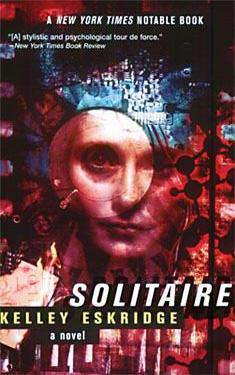Completed 11/17/2018,
Reviewed 11/17/2018
4 stars
This was an
extremely well written novel about a dystopian future with a world government
and an experimental mind-altering technique.
It poses the question of how isolation from human contact for a number
of years affects an otherwise normal, productive person. It was nominated for several awards, including
the Nebula and the Gaylactic Spectrum Awards.
It features a Latina main character, which is pretty rare in science
fiction, who is also a lesbian. Reading
it was quite enjoyable, even though parts were quite grim. While not a thriller, it kept me on the edge
of my seat for most of the book.
 Ren “Jackal”
Sequra is a Hope, a sort of goodwill ambassador to the Earthgov. She works for Ko, a major world corporation,
as a project manager. Two months before her
induction ceremony, a terrible accident occurs, killing over four hundred
people, including most of her closest friends.
Jackal is accidentally responsible for their deaths, but is accused of
being a mass murderer and terrorist. She
takes a deal to plead guilty and is given a long prison term. However, she is offered the opportunity to
undergo an experimental process which would induce the sense that she spent
eight years of solitary confinement in a matter of days, and then be set free. If she takes the deal, what kind of person
will she emerge as?
Ren “Jackal”
Sequra is a Hope, a sort of goodwill ambassador to the Earthgov. She works for Ko, a major world corporation,
as a project manager. Two months before her
induction ceremony, a terrible accident occurs, killing over four hundred
people, including most of her closest friends.
Jackal is accidentally responsible for their deaths, but is accused of
being a mass murderer and terrorist. She
takes a deal to plead guilty and is given a long prison term. However, she is offered the opportunity to
undergo an experimental process which would induce the sense that she spent
eight years of solitary confinement in a matter of days, and then be set free. If she takes the deal, what kind of person
will she emerge as?
The book is
really divided into three parts: her
time as a Hope, her indictment and confinement, and her attempt to rebuild her
life afterwards. Her time as a Hope is a
long introduction that gets us to know Jackal and where she came from. It’s very interesting, but the book really
kicked into gear when she was put into solitary confinement. It’s not exciting, as the term “kicked into
gear” might imply, but it’s very intense, and I felt like I was in stuck in that
small cell in her head with her. The
third part, rebuilding her life, is just as intense. She’s hounded by her probation officer under
threat of being arrested again for any one of many small transgressions. Somehow, she carves out a new life,
discovering a bar called “Solitaire” which is intended for “solos”, survivors
of the mental incarceration she experienced.
Jackal is a
terrific character. Her experience growing
up as a Hope and as a high-powered project manager gives her amazing skills
that initially help her cope with the solitary confinement. But eight years of being isolated can take
its toll on anyone. Still, she’s smart,
brave, and clever. She’s a lesbian, but
it is treated matter-of-fact, well integrated into her character as a
whole. I liked her a lot and found
myself empathizing with her quickly. The
other characters in the book are very vibrant as well, particularly Jackal’s
mother, her probation officer, her girlfriend, and a few of the other solos. No one was a cardboard or throwaway
character.
There’s an
interesting social structure used in the book, known as a web. It’s an eclectic group of friends who take aliases
and are a support system for each other.
That’s where the name “Jackal” comes from. Jackal’s girlfriend’s taken name is Snow and she
comes from a different web. The author
doesn’t go into detail as to how one is formed or what its origins are, but it
seems like an awfully good concept. Jackal’s
web is featured in the beginning of the book, but the concept doesn’t really
appear again until the very end.
I give this
book four stars out of five. It was very
nearly a five, though I didn’t have that as much of an emotional response as a five-star
book should. Still, it’s beautifully written,
and I was greatly caught up in it. The
ending was very satisfying. I would
recommend this book to anyone who wants something a little more cerebral and
emotional in their science fiction.
No comments:
Post a Comment